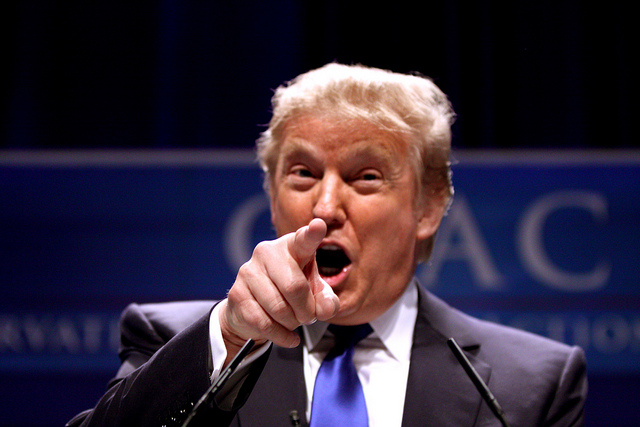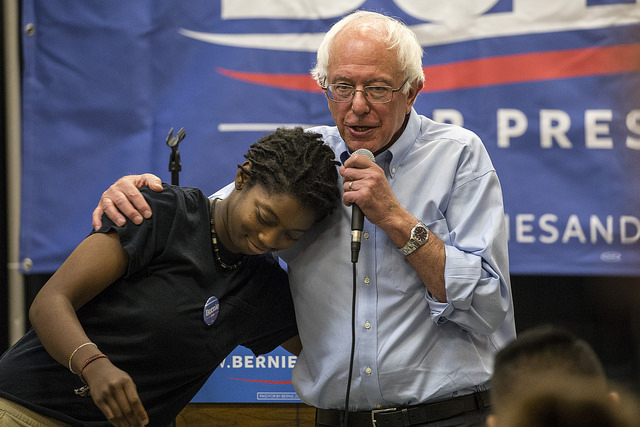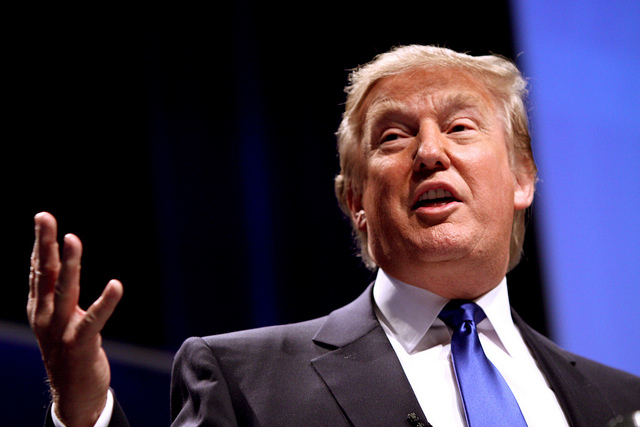Making America Great Again

It's the hot topic melting down our social media accounts and news around the world.
Part circus and part social experiment, the continual- and somewhat meteoric- rise of entrepreneur/property mogul/reality TV star and shameless self-promoter Donald Trump in the Republican Presidential Primaries has been as terrifying to witness as it has been fascinating.
Meanwhile, the Democratic race has proven to be as equally intriguing: the definition of establishment and perhaps the prototype President, Hillary Clinton, against Bernie Sanders, a man who wants to bring about major reform to the political process and the very fabric of the nation itself.
The rise of Trump and Sanders and their respective supporters has been a phenomenon closely watched by Dr Michael Jensen, a Postdoctoral Fellow at the University of Canberra's Institute of Governance and Policy Analysis (IGPA).
As an American, and an expert in political communication, online engagement, and big data analysis, the 2016 Primaries has proven to be a goldmine for Dr Jensen.
He, along with fellow researchers at IGPA have spent the past month-and-a-half collecting hard drives worth of data from social media channels to see how each candidate uses Twitter and Facebook to not only interact with supporters and detractors, but also whether these interactions shape their campaigns, policy decisions and ultimately who will win their election race.

The rise of Trump and Sanders
The unique political and social climate of the United States has provided a "planets aligning" moment for both Donald Trump and Bernie Sanders to springboard into their respective campaigns.
"People are looking for someone who can help them to have a voice to make a difference to the things that affect their lives" said Dr Jensen.
A growing economic gap, spiralling student loans, immigration, gun control and the lingering terror threat has left many Americans disenfranchised with their government, and the direction of the nation.
Both Trump and Sanders have attempted to capitalise on this disengagement and disillusion, but according to Dr Jensen, their approaches while looking similar, are philosophically opposite.
In one corner is Trump and his populist approach. In the other, Sanders and his so-called socialist ideals.
"A lot of it has to do with that sense of being disenfranchised and there are a couple of ways to go about it" explained Dr Jensen, "one is to say 'let's destroy the system', and the other is to create new avenues for people to participate in the political system so that they can reshape political life."
Trump's rhetoric around immigration, his comments about fighting terror, threats about tearing down the establishment, and general pledge to 'Make American Great Again!', tug at the heartstrings of the disillusioned looking for answers.
People are looking for someone who can help them to have a voice to make a difference to the things that affect their lives
"Populist parties are usually native and anti-system, they try to direct a lot of anger."
While also being anti-establishment, Bernie Sander's approach encourages people to participate in the system to bring about change.
"People label Bernie Sanders as being the Democrats version of Donald Trump because he's a populist who talks against the system. We take a different perspective in arguing that Sanders is not populist in that sense, he's more connectivist.
"He wants a movement to not just be about electing him to be president, but to enable people to have a role in fashioning change and forcing their elected representatives to be accountable, and to give them a voice so that their participation will be consequential.
"That kind of connecting mechanism is a lot different to the populist line which is against the system."
The modern soapbox
Even with their different approaches, Trump and Sanders, like all other candidates have taken to social media to drum up votes and mobilise their supporters.
To analyse the impact of this engagement, Dr Jensen and his team are collecting tweets and Facebook posts from and to candidates from the start of the Iowa Primaries through until the recent Super Tuesday.
The month-and-a-half of posts and tweets will amount to about 15 gigabytes of data which will be analysed using keywords and phrases to see who is talking about what, and to see if there are correlations between social activity and the shaping of campaigns over time.
However, research of past campaigns suggests that direct interaction with the public has little or no effect on swaying the votes of individuals.
"A lot of people have tried to draw inferences between tweeting and posting on Facebook and electoral performance. But only about 15% of the population use social media for political purposes, and they tend to already be strong partisans and politically engaged."
It's not terribly surprising that Trump would retweet a quote from Mussolini
That's not to say however that social media does not affect an election. A well-coordinated social media strategy can play a strong part in shaping the narrative around a candidate through indirect means.
"Something that a lot of campaigns do on Twitter is to prosecute their campaigns. So they might reply to other candidates directly or indirectly, sometimes they or their surrogates will take on the media.
"The campaign can't always take on the media directly because they will start getting bad press, so they get other people to take on the media by asking questions and commenting."
Like all media however, social media can backfire on candidates, and should be taken with a grain of salt by consumers.
Dr Jensen has not only seen candidates purchase followers and use posting bots, but also found seemingly candid posts by candidates in the moment were actually made by staffers back in an office.
"It's not terribly surprising that Trump would retweet a quote from Mussolini, because in a lot of ways they both have authoritarian styles which comes back to their approach to politics and their view of the role of leader and the political system."
The recent explosion in popularity of comedian John Olivers' #MakeDonaldDrumpfAgain campaign has also seen Trump's favourite platform quickly turned against him. The campaign, which seeks to highlight the hypocrisy and absurdity of Trump received 75,000 hashtag repetitions in only three-and-a-half hours, more mentions than Trump's own Twitter handle which averages 20,000 mentions per hour.

President Trump?
So can Donald J Trump actually become the Republican Presidential Candidate and win a general election?
"One hopes that these things will get sorted out in the general election process" said Dr Jensen, who has doubts whether the Grand Old Party will allow such a divisive figure to lead them to an election.
"In a lot of ways Donald Trump is able to emerge based on the foundations of bringing that populist anger into the party. They had the welcome mat out there and now they're realising 'hey wait a second, this is going a little too far, this is going much further than any of us and our network of donors is willing to accept'. He really disrupts a lot of the positions that they have out there, and a lot of people think that the party is being hijacked.
"But Trump is in a better position to capture the nomination than even Mitt Romney was in 2012, and there was an air of inevitability about Romney that year. I think Trump is going to be more inevitable, he did well on Super Tuesday, and the Republicans will have a difficult decision to make.
"Do they fall in behind him? Do they splinter and try to stop him? Do they go with Trump as the nomination and destroy the coalition they've built up over the last 25 years?"
Do they go with Trump as the nomination and destroy the coalition they've built up over the last 25 years?
However, blocking Trump's nomination- while satisfying donors and powerbrokers- could backfire badly on the party, giving the Democrats a saloon passage to another four years in the White House.
"This is the danger. If he is an independent there is a chance that he will do better than the Republican candidate, what does that do to the Republican Party? There is a lot of anxiety because of the fracture in the coalition."
Despite his undoubted appeal and revolutionary ideas, Dr Jensen believes Bernie Sanders will struggle from here on to capture the Democratic nomination.
"Hillary is going to win. Sanders says he's in it until the end, but I just don't see that as a viable strategy, I just don't see where the votes are going to come."
Words by Daniel Murphy, images courtesy of Gage Skidmore, Flickr, Phil Roeder, Flickr
 | Michael JensenPostdoctoral Fellow, Institute for Governance and Policy AnalysisDr Michael Jensen is a Research Fellow at the Institute for Governance and Policy Analysis. Prior to his position at IGPA, he was Juan de la Cierva Postdoctoral Fellow in the Department of Political Science and a researcher at the Institute for Government and Public Policy at the Autonomous University of Barcelona and has been a visiting scholar at the Internet Interdisciplinary Institute in Barcelona as well as the New Political Communication Unit at Royal Holloway, University of London. He completed his PhD at the University of California, Irvine under the supervision of James Danziger, David Easton, and Alladi Venkatesh. You can connect with Dr Jensen via email or visit the IGPA website for more information about the Institute and their research. |

